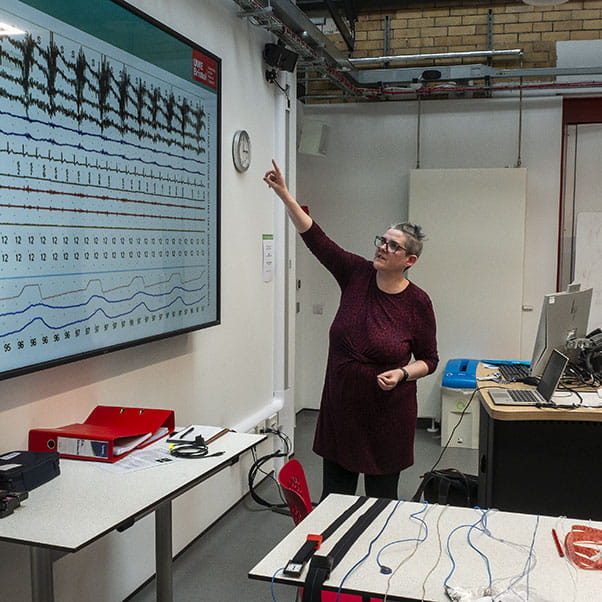Procurement of healthcare science equipment to support training
Discover how funding has recently created an opportunity to improve Healthcare Science training delivered at UWE Bristol.
Background
UWE Bristol were trailblazers in developing in-post training for Healthcare Science Practitioners, which could be delivered to trainees across England through a blend of online and on-campus sessions.
The suite of training in healthcare science offered by UWE Bristol has expanded recently to include three new postgraduate courses commissioned by NHS England (NHSE). In response to this, the College for Health, Science and Society secured funding from NHSE for the procurement of the latest equipment and software. These resources supported hands-on training designed to develop practical and technical skills in clinical physiology.
The incorporation of this new suite of technology into our courses over the past year has revolutionised teaching and assessment. Our trainees have gained significant benefit from being able to develop clinically relevant experience and skills in a supportive learning environment. We'll continue to measure the impact of this on trainees and the workplace as we further embed the use of this new equipment and software across our clinical physiology courses.

"Clinical physiologists are fundamental to the diagnostic pathways for respiratory, sleep, cardiac and neurophysiology. They're key to innovation in healthcare through their involvement with clinical and translational research, and patient-centred service transformation. "
Adrian Kendrick Programme Leader and Senior Lecturer in Respiratory Physiology at UWE Bristol
About the project
The Clinical Physiology teaching team within the School of Applied Sciences has an established reputation in delivering in-post training through the Healthcare Science Practitioner Degree Apprenticeship. This includes three specialist areas – Cardiac Physiology, Respiratory and Sleep Physiology, and Neurophysiology.
In 2023, following a successful bid the team were awarded NHSE tenders to deliver three new in-post training courses. These were a PG Certificate in Sleep Medicine, a PG Certificate in Clinical Echocardiography, and a Graduate Diploma in Respiratory Science.
Following this, the College for Health, Science and Society was awarded further NHSE funding for equipment to support this training in courses such as these. We identified a range of modern technology to mimic or simulate the clinical environment. A dedicated training room was identified on Glenside Campus and new equipment and software were successfully onboarded ahead of the start of the 2023/24 teaching year.
The expansion of facilities has enabled us to design and deliver teaching sessions to develop practical and technical skills. Often trainees aren't exposed to the full range of technology within their departments. Exposure to a wider range of equipment helps to broaden their technical and practical skills and prepare them for future careers in healthcare science.
The simulation equipment purchased has enabled us to create realistic scenarios that mimic the challenges of a clinical environment. This provides exposure to the diverse range of patient cases that trainees may encounter during their subsequent careers. Examples of this are the use of the Spacelabs analysis system and suite of Philips Ultrasounds machines. Trainees in Cardiac Physiology and Clinical Echocardiography can now practice responding to different cardiac events using electrocardiography or cardiac imaging, enhancing their decision-making and critical thinking skills. Such exposure to realistic scenarios instils confidence in trainees. When faced with patients in clinical settings, they're better equipped to apply their knowledge and skills, having already navigated similar situations in a controlled, simulated environment.
A further significant advantage of having access to this equipment is that we can now embed OSCE-style assessments into our courses. Assessment of clinical competence has traditionally always been restricted to the workplace. Having the ability to embed structured clinical assessments into our courses ensures that the education we provide aligns to trainees' professional practice. This further ensures that graduates have the highest level of knowledge and skill in their specialist area.
"The purchase of these technologies and devices have enhanced our diagnostic simulation capabilities and enriched learning for students. They’ll become an enabler of research within the field of physiological sciences, significantly improving patient outcomes and the study of diagnostic physiology across all pillars."
Duncan Sleeman Programme Leader and Senior Lecturer in Cardiac Physiology at UWE Bristol
Meet the project team
-
 Dr Karina StewartAssociate Director for Healthcare Science, Senior Lecturer in Physiology at UWE Bristol
Dr Karina StewartAssociate Director for Healthcare Science, Senior Lecturer in Physiology at UWE Bristol -
 Dr Kathryn YuillBSc(Hons) Healthcare Science (Physiological Sciences) Programme Lead, Senior Lecturer in Physiology at UWE Bristol
Dr Kathryn YuillBSc(Hons) Healthcare Science (Physiological Sciences) Programme Lead, Senior Lecturer in Physiology at UWE Bristol -
 Mr Duncan SleemanPCCert Clinical Echocardiography Programme Lead, Senior Lecturer in Sleep Physiology at UWE Bristol
Mr Duncan SleemanPCCert Clinical Echocardiography Programme Lead, Senior Lecturer in Sleep Physiology at UWE Bristol -
 Dr Lizzie HillPGCert Sleep Medicine Programme Lead, Senior Lecturer in Sleep Physiology at UWE Bristol
Dr Lizzie HillPGCert Sleep Medicine Programme Lead, Senior Lecturer in Sleep Physiology at UWE Bristol -
 Dr Adrian KendrickGraduate Diploma Respiratory Science Programme Lead. Senior Lecturer in Respiratory Physiology at UWE Bristol
Dr Adrian KendrickGraduate Diploma Respiratory Science Programme Lead. Senior Lecturer in Respiratory Physiology at UWE Bristol -
 Dr Sarah RushtonSenior Lecturer in Neurophysiology at UWE Bristol
Dr Sarah RushtonSenior Lecturer in Neurophysiology at UWE Bristol -
 Mrs Catherine DixonSenior Lecturer in Respiratory Physiology
Mrs Catherine DixonSenior Lecturer in Respiratory Physiology -
 Mrs Amanda Abdel-AzizSenior Lecturer in Cardiac Physiology
Mrs Amanda Abdel-AzizSenior Lecturer in Cardiac Physiology
